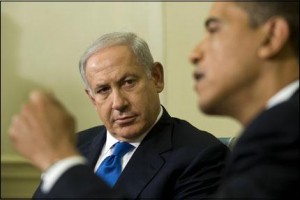
ISRAEL has refused to reassure President Barack Obama that it would warn him of a pre-emptive strike on Iran’s nuclear infrastructure, raising fears that it may be planning an attack as early as the next northern summer.
The US leader was rebuffed when he demanded private guarantees that a strike would not go ahead without White House notification, suggesting that Israel no longer plans to ”seek Washington’s permission”, sources said.
The disclosure, by insiders briefed on a secret meeting between America’s most senior defence chief and Israeli Prime Minister Benjamin Netanyahu, comes amid concerns that Iran’s progress towards nuclear weapons means Israel has lost hope for a diplomatic solution.
Last week, UN weapons inspectors released their most damning report to date into Iran’s nuclear activities, saying it appeared to be building a nuclear weapon. It was with that possibility in mind that US Defence Secretary Leon Panetta flew into Israel last month on what was a routine trip.
Officially, his brief was restricted to the Middle East peace process, but the most important part of his mission was a private meeting with Mr Netanyahu and Defence Minister Ehud Barak. Once all but a handful of trusted staff had left the room, Mr Panetta conveyed an urgent message from Mr Obama. The President, Mr Panetta said, wanted an unshakable guarantee that Israel would not carry out a unilateral military strike against Iran’s nuclear installations without first seeking Washington’s clearance.
The two Israelis were notably evasive in their response, according to sources both in Israel and America.
”They did not suggest that military action was being planned or was imminent, but neither did they give any assurances that Israel would first seek Washington’s permission, or even inform the White House in advance that a mission was under way,” one said.
Alarmed by Mr Netanyahu’s noncommittal response, Mr Obama reportedly ordered the US intelligence services to step up monitoring of Israel to glean clues of its intentions.
What those intentions might be remains murky. Over the past fortnight, Israel’s press has given every impression that the country is on a war footing, with numerous claims that Mr Netanyahu and Mr Barak are lobbying the cabinet to support the military option.
Two weeks ago, Israel tested a ballistic missile capable of reaching Iran, its first such test since 2008. Shortly before, the Israeli air force took part in NATO exercises in Sardinia. A separate exercise around Tel Aviv tested civilian readiness in the event of a missile strike.
In a sign of the febrility of the public mood, many beach-goers apparently mistook the air raid sirens for an attack and fled in panic for their cars. Likewise, there were similar jitters in Iran on Saturday when a vast explosion at an arms dump outside Tehran shook the city.
Speculation about an imminent Israeli military action has been a regular occurrence over the years, but rarely as fevered as now. Last week, a British official even suggested that an attack could come before Christmas.
But most Israelis believe the difficulty of mounting an operation when winter cloud cover hampers aircraft targeting systems means that if military action is being considered, it will not come before the spring or summer of next year.

Leave a Reply
You must be logged in to post a comment.